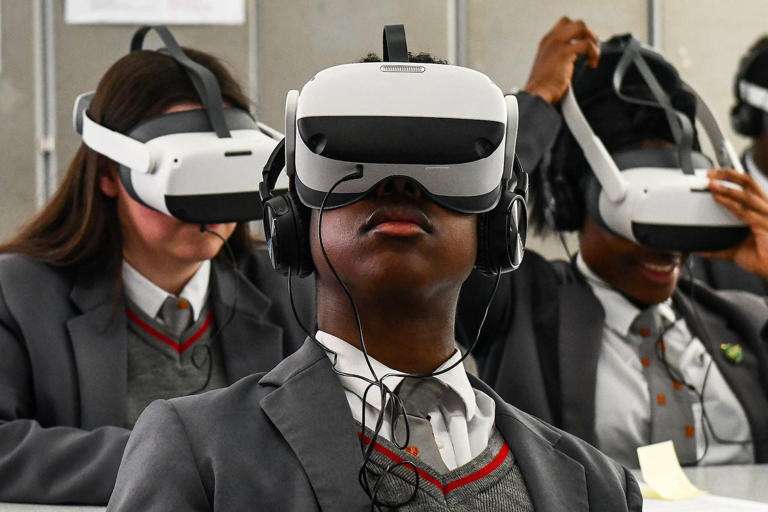A new technology utilizing artificial intelligence (AI) will enable students to engage in conversations with Holocaust survivors even after their passing. This initiative, implemented in UK schools, aims to preserve the memories and experiences of real survivors by creating lifelike interactions with students.
This program comes at a critical time, as anti-Semitism is on the rise in the country, and the number of Holocaust survivors is declining. Karen Pollock, the chief executive of the Holocaust Educational Trust, emphasized the importance of teaching young people about the Holocaust, especially in the face of conspiracy theories and misinformation prevalent on social media.
She stressed that Holocaust education is essential due to the unfortunate reality of Holocaust denial, distortion, and the misuse of its history for personal agendas, which tarnish the memory of this tragic event.
Furthermore, the purpose of this is to highlight the personal experiences of individuals and demonstrate that their stories are genuine. This allows others to listen and learn about their experiences and also visit the locations that they mention.”
Ms. Pollock also emphasized that there has been a significant rise in antisemitism recently, including the inappropriate use of Holocaust-related language.
Currently, Holocaust survivors share their experiences with thousands of students each year. However, due to their advanced age, it is becoming increasingly challenging for survivors in their 80s and 90s to travel across the country to speak to students in person. In the near future, there will be no living survivors of the Holocaust.
Fortunately, the combination of speech-to-text recognition AI search technology and a filming technique involving a nine-camera rig has resulted in the creation of virtual 3D representations of Holocaust survivors. These virtual survivors are capable of answering up to 1,000 questions from students.
The use of artificial intelligence (AI) allows for a natural conversation experience with a Holocaust survivor by understanding the question and playing back the survivor’s recorded answer. Additionally, students can use virtual reality (VR) headsets to explore important locations related to the survivor’s testimonies, such as their hometowns before the war and the concentration camps where they were imprisoned. This technology aims to create lasting and impactful learning experiences about the Holocaust for future generations. Recognizing the aging and decreasing number of Holocaust survivors, the initiative seeks to implement this program in schools now rather than waiting for their absence in the future. The program will feature Manfred Goldberg, a survivor of the Stutthof concentration camp and a death march, as the first participant for pupils across the UK.
The 94-year-old has been sharing his testimony with young people in schools for the past 20 years. Many students have described hearing his story as a life-changing experience. Despite his age, this powerful reaction from the students motivates him to continue his work.
Mr. Goldberg, who resides in north London, believes that one crucial factor has been successfully addressed – ensuring that future generations can hear the words of a Holocaust survivor.
To create a virtual version of himself, Mr. Goldberg spent five days being filmed in a green screen rig using special volumetric capture cameras. This allowed for multiple angles to be captured simultaneously. He answered over 1,000 questions to ensure that his virtual self could provide answers to almost any question a student may have about the Holocaust.
He expressed his astonishment at the thought of his own story being immortalized in such a way, never imagining during the dark days of the Holocaust that it would happen.
Schools are making efforts to combat the increasing instances of antisemitism and other forms of prejudice by educating students about various religions and how to foster positive relationships with their peers. This technology will serve as an additional tool to achieve this goal.
Pepe Di’Iasio, the general secretary of the ASCL, shared his excitement about the potential impact of reaching millions of students with his message, as he has already spoken to thousands over the years. He considers it a remarkable legacy if this technology can help spread his story.
The Testimony 360 program was officially launched at Sacred Heart Catholic School in Camberwell, London on Wednesday.
By 2025, virtual testimonies from three other Holocaust survivors will be introduced in schools.
According to Pepe Di’Iasio, the general secretary of the Association of School and College Leaders, the new technology will greatly assist educators in bringing this crucial topic to life for future generations of students and ensuring their understanding of the historical significance.
Schools are actively addressing the increase in antisemitism and other forms of prejudice by educating students about various faiths and promoting positive relationships with their peers. This technology will serve as an additional tool to support these efforts.
However, schools are facing challenges due to the spread of harmful content and disinformation on social media. It is imperative for swift action to be taken by the government to prevent the dissemination of hatred through these platforms.
The upcoming government must take a firm stance against technology giants, compelling them to prevent the spread of hatred in society through their platforms.
According to a recent report from Unesco, there is a concern that generative AI could be misused by malicious individuals to spread disinformation and promote antisemitism related to the Holocaust.
Don’t miss out on the latest news and insights from the Evening Standard. Sign up now for our newsletters, which cover daily news, Homes & Property insights, lifestyle tips, entertainment options, special offers, and more. For the top stories delivered straight to your inbox, click here.
